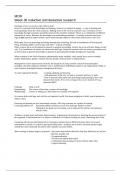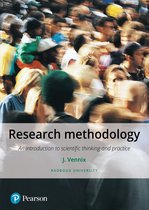MOR
Week 36 Inductive and deductive research
Ontology is how we see the world. What is real?
Science is concerned with knowledge and learning. Science is a method of inquiry – a way of learning and
knowing things about the world around us. Making sense of the world in a specific way. Generation of new
knowledge through systematic (scientific) research (the scientific method). Theory is a combination of different
statements of reality. Research for knowledge uses methodology/methods. A scientific assertion must have
logical and empirical support (which can be tested through empirical observation and become a new law).
Philosophy focus on generating knowledge through pure reasoning, focused on foundations of knowing and
being, including subjects such as logic and ethics - Logical reasoning
Other sciences focus on the empirical research to generate knowledge. Science has to do with how things are and
why. Two foundations of science are observation and logic. Empirical research relies on sensory perception such
as observation to generate knowledge as opposed to generating knowledge through pure reasoning.
When scientists in the field of business administration study variables, whey mostly focus on for example;
people, departments, groups, relations between people, characteristics of organizations.
Management science (operational research): the discipline of using scientific research-based principles,
strategies, and other analytical methods, such as mathematical modelling to improve any organizations ability to
enact rational, meaningful business management decisions.
To reach Agreement Reality: - Looking, thinking and knowing
- And agreement on the way we look as scientists and how to ‘look’
- How to translate observation into knowledge (epistemology). How can I
measure that exactly. If it is now average, how can we measure it? (e.g.
classroom 80%)
Ontology What is real?
Epistemology The science of knowing, systems of knowledge.
Methodology Science of finding out, procedures for scientific investigation.
So science deals with logic and with the real empirical world. Not about metaphysics, belief, moral opinions or
ethical values.
Knowing and learning are two interrelated concepts. All living creatures are capable of learning.
Learning problems are: Reasoning abilities: humans are not clear and logic thinkers at birth.
Debating is not good way of learning, can be impacted by motions and statement
which is false.
Tradition can both assist and hinder human inquiry. Argumentum ad hominem is attacking the person instead of
the argument. Confirmation bias is a selective collection of evidence (looking for proof, dismissing other info).
Consulting all relevant information before forming an opinion may be difficult because there is too much
information to consult. Or selective perception/observation - tendency not to notice and more quickly forget
stimuli that cause emotional discomfort and contradict our prior beliefs.
Short comings of human inquiry in general: - Inaccurate observations (describe what they think they see and not
what they actually see)
- Overgeneralization
- Selective perception/observation
- Confirmation bias (looking for proof, dismiss other info)
- Logical reasoning
,Logical reasoning
When heated, metals will expand (law)
Iron is a metal (condition)
_______________________________
Iron will expand when heated (inference)
This plate is made of iron (condition)
_______________________________
The plate will expand when heated (inference)
Logic p – q
If P then Q; (P->Q)
P holds; (P)
Therefore Q (Q)
P is true -> what about Q?
Quite clear: P -> Q
When it rains, the streets get wet
P = it rains; Q: the streets get wet
Denying the antecedent:
P is not true (~P) -> what about Q?
Q is not per definition untrue (Invalid)
It does not rain -> q is not per definition untrue
Affirming the consequent:
Q is true -> what about P?
P is not per definition true (Invalid)
The streets get wet -> p is not per definition true
Mode tollens: mode that denies
Q is not true (~Q) -> what about P?
Quite clear: ~P -> ~Q
The streets are not wet -> it is not raining
Modus Ponens: mode that affirms
, Deduction
Deductive logic is a form of argument
Deductive science is a form of science.
Deduction works from the universal to individual (general (theory) -> specific (observation) -> conclusion)
Syllogism: example of deductive argument. The conclusion follows from the truth of two or more premises:
All humans are mortal (P1) (premises 1)
X is a human (P2) (premises 2)
X is mortal (C) (conclusion)
Valid argument ≠ true conclusion
Argument is valid when conclusions follow logically from the premises. Correspondence with reality is not the
topic of formal logic.
Induction
Inductive logic is a type of argument
Inductive science is a type of science
Works from specific to general (Specific (observation) -> General (Theory) -> Conclusion)
Create new theory: Induction – Abduction – deduction
Induction and abduction can lead to new knowledge.
Complete induction:
All X have been studied All trees are studied
All studies X have characteristic Y All studied trees have green leaves
Conclusion: All X have characteristic Y All trees have green leaves
Incomplete induction:
I have seen a number of trees
All those trees have green leaves
Conclusion: all trees have green leaves
(you can never observe all trees = inductive logic)
Abduction = reduction = hypothesis
Creates protentional new knowledge. Creating a hypothesis which can explain an empirical phenomenon.
If we have two explanations for he same phenomenon, we should always choose the simpler of the two, because
simpler solutions are more likely to be right. Creating a hypothesis, which can explain an empirical phenomenon.
(Big bang, continental drift)
Core concepts in science
Model is representation of a certain phenomenon
- Implicit helps understand life, trust, relationships. We use them everyday but are not aware of the
nature of our mental models. We can only communicate them to others by making them
explicit.
- Explicit
o Physical
o Conceptual
Verbal
Schematic
Mathematical
Laws in science have everything to do with patterns and regularities
Experiment refers to an artificial research setting, created fort he purpose of testing hypothesis.
Hypothesis starts with working assumption,
Theory Facts and statements need to be ordered in a logical, consistent whole.






